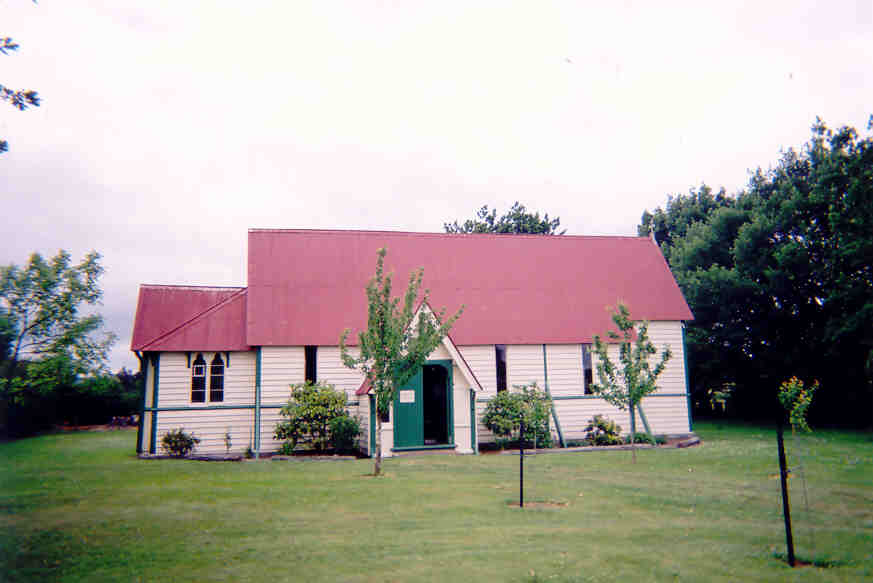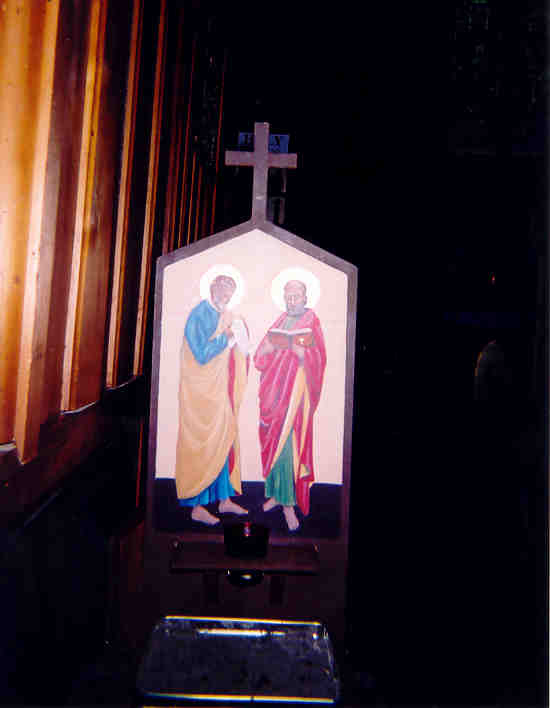Spotlight Front Page
Previous issue
SPOTLIGHT 2006
TO CANTERBURY AND DUNEDIN
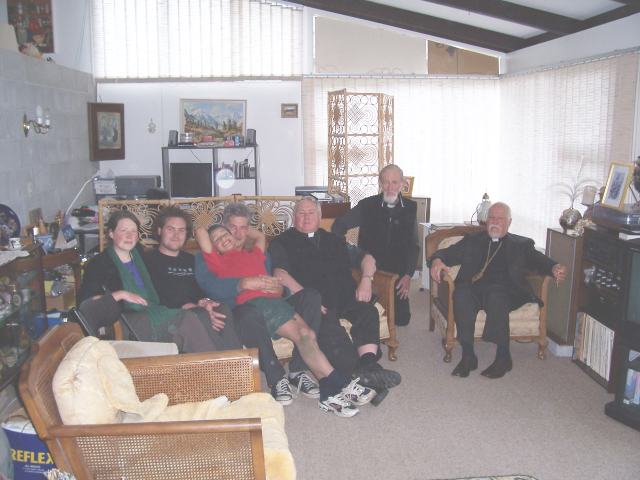
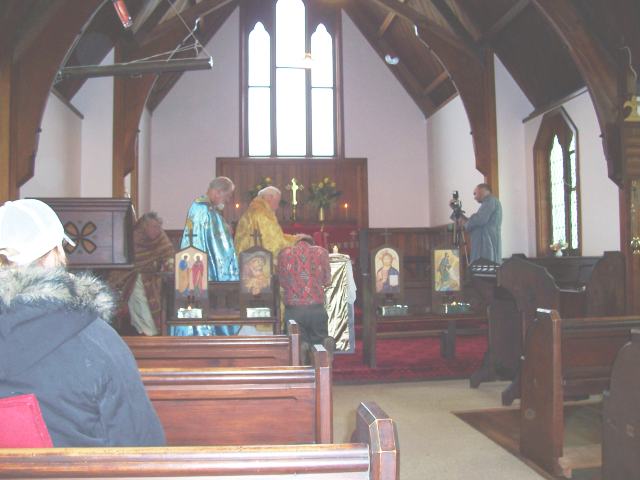
Meeting on Friday at Diamond Harbour Ordination on Saturday at Greenpark
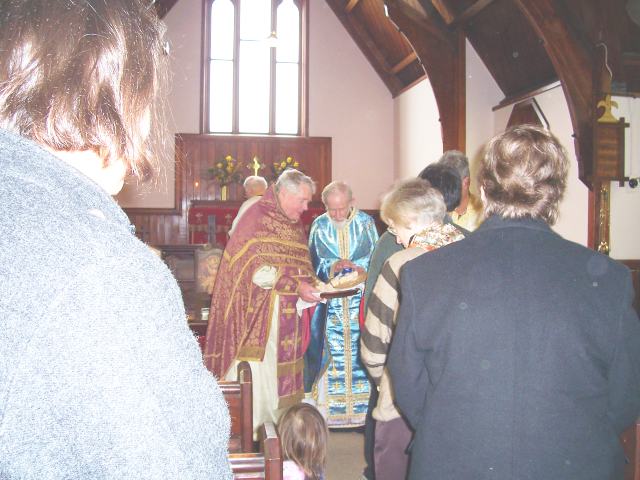
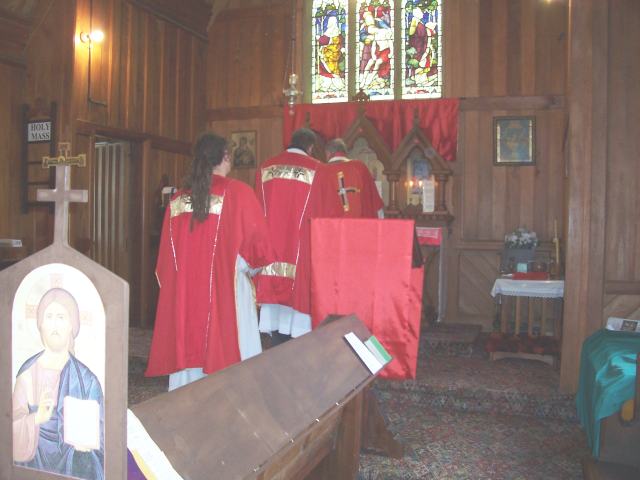
Antidoron at Greenpark Patronal Festival at Ashley
Saturday, 9 9 06 at Greenpark Church: 9 am Matins, 10 am LITURGY, with ordination of Keith Morrison as Deacon;
12 noon hangi and pot-luck lunch in Memorial Hall; strategic mission planning with His Eminence
NEW VENUE FOR CHRISTCHURCH SERVICES WITH FR VICTOR
395 Memorial Avenue
Serb tragedy needs epilogue
THE JAPAN TIMES
Friday, June 2,
2006 By JIRI DIENSTBIER
PRAGUE -- Serbia's long tragedy looks like it is coming to an end. The death of Slobodan Milosevic has just been followed by Montenegro's referendum on independence. Independence for Kosovo, too, is inching closer.
The wars of the Yugoslav succession have not only been a trial for the peoples of that disintegrated country; they also raised huge questions about the exercise of international justice.
Do international tribunals of the sort Milosevic faced before his death promote or postpone serious self-reflection and reconciliation in damaged societies? Do they strengthen or undermine the political stability needed to rebuild wrecked communities and shattered economies?
The evidence on these questions is mixed. Indeed, the record of the International War Crimes Tribunal for Former Yugoslavia (ICTY), based in The Hague, may be instructive in judging the credibility of the strategy of using such trials as part of the effort to end civil and other wars. In 13 years, the ICTY, with 1,200 employees, spent roughly $ 1.25 billion to convict only a few dozen war criminals.
Moreover, whereas members of all ethnic groups committed crimes, in its first years, the ICTY indicted and prosecuted far more Serbs than others, fueling a perception, even among opponents of Milosevic's regime, that the tribunal was political and anti-Serbian.
We may regret that Milosevic's own trial ended without a conclusion. But a conviction only of Milosevic, however justified, without parallel penalties for his Croat, Bosnian and Kosovo-Albanian counterparts would hardly have contributed to serious self-reflection within the post-Yugoslav nations.
To be sure, the arrest of Gen. Ante Gotovina, adored by many Croats as a hero, but responsible for the brutal expulsion of a quarter-million Serbs from Croatia and northwest Bosnia -- the biggest ethnic cleansing in Europe since World War II -- improves the ICTY's standing. But Milosevic's Croatian and Bosnian counterparts, Franjo Tudjman and Alija Izetbegovic, respectively, remained unindicted when they died.
So, too, the main commanders of the Kosovo Liberation Army (UCK). Ramush Haradinaj, the prime minister of Kosovo, was accused but later released from detention.
I have always been convinced that Milosevic should have been put on trial in Belgrade. After all, Milosevic's critics and political rivals such as the journalist Slavko Curuvija and Milosevic's former mentor, Ivan Stambolic, were assassinated by Serb police agents, who also tried three times to murder the opposition leader Vuk Draskovic. There was, moreover, ample evidence of corruption among Milosevic's inner circle, including members of his immediate family.
Holding the trial in Belgrade might have served better to catalyze a sober examination of the past. The atmosphere was certainly favorable. The majority of Serbs hold Milosevic responsible for the decline of their society.
Even before his fall, the opposition controlled most big Serbian cities, and in 2000 he lost the election that he called to shore up his authority. The relatively small turnout at his funeral confirmed that only a minority of Serbs considers him a national hero.
Meanwhile, with the exception of Slovenia, the democratic transformation in the post-Yugoslav region remains uneasy. Wars, ethnic cleansing, embargoes and sanctions created not only psychological traumas, but also black markets, smuggling, large-scale corruption and de facto rule by mafias. The bombing of Serbia by NATO in 1999 heavily damaged its economy, with serious consequences for neighboring countries.
The definitive end of what remains of Yugoslavia may -- at least today -- pose no danger of war, but the Muslim Sandjak region will now be divided by state boundaries, and Albanian extremists, with their dreams of a Greater Albania, believe their influence in a separate Montenegro will be reinforced with a yes vote on independence.
Most Serbs and Croats in Bosnia believe that the best solution to the problems of that sad country would be to join the territories that they inhabit with their "mother" countries.
Then there is the unresolved status of Kosovo, where the Albanian majority demands independence, and extremists threaten to fight for it. As one Kosovo Liberation Army commander warned, "If we kill one KFOR soldier a day, these cowards will leave."
With independence, the extremists would gain a territorial base from which to undermine Macedonia, southern Montenegro, and southern Serbia, jeopardizing stability in the entire region.
Serbia is offering Kosovo the formula "less than independence, more than autonomy." It demands security guarantees for the Serbian minority and cultural monuments, as well as control of the borders with Albania and Macedonia to stop traffic in arms, drugs and women, and to prevent the use of Kosovo by Albanian extremists.
Any resolution of Kosovo's status is problematic, but the international community should not repeat old mistakes. In 1991, the principle that only a politically negotiated division of Yugoslavia would be recognized was abandoned. Now, as then, a change of boundaries without the consent of all concerned parties would not only violate international law, but could also lead to violence.
The
international community must not be gulled into thinking that war-crime
trials marginalize, rather than mobilize, extremists and nationalists.
Pressure on Croatia and Serbia to arrest and hand over suspects -- a
condition of EU accession negotiations -- has yielded several
extraditions and may result in more. But further trials alone are
unlikely to bring about the long-term settlements that the region's
fragile states need in order to ensure stability and democratic
development. The people of the Balkans should feel that the EU offers
them political and economic support. They deserve it.
Jiri Dienstbier was foreign minister of Czechoslovakia and special rapporteur of the UNHRC in the Balkans.
DIVINE OFFICE
LAUNCHING OF DIGITAL EDITION
The new edition has taken the opportunity to include much more music, from the Ratisbon 1901 edition. It is now complete, except for correction of some errors which keep appearing as it is used. The main section counts 2099 pages, with XL pages of rubrics etc and about ccc pages of the Common of Saints, etc.
The whole work is available for downloading in a series of MsWord files, on this website, that is at:
I am pleased to say that interest has been shown in publishing it, and I hope to hear now from my correspondent with a view to making plans. In the course of considering this I have become aware that commercial printers would prefer to deal with the unsplit files, and some of these are not yet displayed and will need a little proof-reading to be ready.
The launching of the digital edition of our Western Rite Office book will take place at the Ministers' Association meeting here on Tuesday June 20. Sext will be sung and some prayers. A booklet has been printed to give to the clergy and the Committee as a memento. We are also planning to make a little gift of the well-known late evening service of Compline in commemoration of the completion of this new edition. We have printed a sufficient number of copies both with and without music.
When I was an Anglican Deacon I took tutorials from the then Vicar of S. Michael's, Christchurch, Fr Cecil Gault, in celebrating Mass. From his introductory remarks I remember something like: 'you should write in the front cover of your Office Book: "the task of a priest is to love God more each day.'" I have never thought myself very successsful at this, but recently I have picked up a CD of Austrian operettas in which there is a song which with schmaltzy melody goes as follows:
Well, that describes my experience of the Divine Office over the years, especially during some months in 1972 when we were all unable to go to Communion (no longer Anglicans, and no Orthodox Liturgy available yet) and had only the Office to support us. I remember how all our family gathered in our sunroom in Dunedin to recite Lauds on Sunday mornings, until I went to be ordained in Melbourne in September..
We had of course been taught in clergy training to say the Office daily, and I remember a Saturday Compline sermon at College House by the Revd David Taylor in which he testified that he had never known a day when his father, the Archdeacon, had failed to observe this duty, even when sick. I was much impressed by this, and tried to follow that example, and it came to be to me a sort of immersion in the Divine charity.
If I were asked to characterize this work, I would say that, based as it is on the Latin Breviary of 1828, using Book of Common Prayer English throughout, it could be regarded as the book which the C of E. authorities might have produced if the compilers had not had to regard the illiteracy of many of the clergy in Latin and of many of the laity in English on the one hand, and the pressure from continental "reformers" on the other. It does not, however, attempt to follow the minor variations to be found in the Sarum documents and followed in the BCP, as this has made previous books unduly complex..
From time to time I have recited most or all of the Hours in this work with people of quite limited education, who could read aloud, but with some hesitation at times; and they apppeared to find it edifying. If it is disregarded, I guess that it is more likely to be by people who regard themselves as too sophisticated to be able to learn from sources going back to the earliest ages of Christianity.
I yield this work to almighty God who has spared me to complete it, and to the christian world, with no stipulation at all as to how those who download it may use it, and in the good hope that, as J H Newman said of his essay on the Articles, I having shown how it can be done, others may come along and do it better.
Although the simplification and conflation of the Offices into the Matins and Evensong of the English Prayer Book represent a very sound framework for worship even in our day, as is testified by their continued use, by hierarchical authority, in a number of our parishes, it should be remembered that the Anglo-catholic movement was a sort of pilgrimage towards an increasingly fuller appropriation of the liturgical inheritance.That this became a "Pilgrimage to Orthodoxy" is a cause for gratitude. But it is to be expected that the liturgical pilgrimage will continue (not a detour into the Eastern culture, but) into the complete Western culture. The use by parishes of this Office as a source-book may be a means to this. My own feeling is that eventually it may be found acceptable in the worship of some parishes as a whole.
I must record my thanks, firstly to the Ashley Church Committee for their patience in allowing us to make ourselves at home and to pray in their Church for 20 years in spite of rather dismal numbers of worshippers, (whether Orthodox or not); also for the Revd Fr Dr I J Nield who with his characteristic rigour urged me to make a "proper book", and kept me at it; and to Dr S. Tschipouras who began the scanning for me. And to those who have so kindly encouraged me over the last 4 years. The rest is all my fault.
Our Deanery website now contains a number of articles expanding on the thinking that has gone into our attempt to develop an exemplary pattern for involving English-speaking people in the wholeness of the historic christian inheritance, to which our visionary Church of Antioch has committed herself both in America and now in a few other places. Follow the links.
MOSCOW - ROCOR REUNION

May 20, 2006
KiM Info Newsletter 20-05-06
Russian Church Abroad Ruling Body Approves Reunion With Moscow
The governing body of the Russian Orthodox Church Outside of Russia (ROCOR) voted Friday evening to reunite with Moscow, signaling the end of an 80-year rift.
MOSCOW, May 20 (RIA Novosti)
http://en.rian.ru/russia/20060520/48375908.html
 The governing body of the Russian
Orthodox Church Outside of Russia (ROCOR) voted Friday evening to
reunite with Moscow, signaling the end of an 80-year rift.
The governing body of the Russian
Orthodox Church Outside of Russia (ROCOR) voted Friday evening to
reunite with Moscow, signaling the end of an 80-year rift.
A statement on the ROCOR Web site said the church's Council of Bishops had approved an Act on Canonical Communion drafted this week by the church's international conference, the All-Diaspora Council held in San Francisco. The ROCOR will now join the Moscow Patriarchate as a self-governed branch, similar to the Ukrainian Orthodox Church.
It will retain its autonomy in terms of pastoral, educational, administrative, economic, property and secular issues.
The revolutions of 1917 and ensuing Civil War in Russia caused a split in the Russian Orthodox Church in the 1920s, when some top clergy in exile refused to be subordinated to Church leaders who had allegedly collaborated with the Communists.
Metropolitan Laurus, the head of the ROCOR, visited
Russia in May 2004 and participated in a number of joint services. The
sides decided at the time to set up joint commissions, and determined
the range of issues to be discussed at the All-Diaspora Council, which
met for the first time since 1974.
Normally the news items reaching us from the KIM have concerned the very serious situation in Kosovo and Metohija, as in the articles below.

The Washington Times, May 9
Kosovo consternation
Tuesday, 9 May 2006
Because of the linkage and overlap among terrorist networks and organized criminal gangs, the battle against trafficking is also an integral part of the war on terror.
Fighting organized criminal activities is difficult even in countries with a functioning legal system, honest police and the rule of law. Think how much harder that would be when dealing with an independent country where the authorities are an integral part of the criminal enterprise.
Amazingly, that's what the international community seems to want to help establish in the Serbian province of Kosovo. When Kosovo was placed under United Nations administration and NATO military control at the end of the 1999 war, some hoped the province soon would meet at least minimum qualifications for some kind of independence, as demanded by Muslim Albanians who greatly outnumber the remaining Christian Serbs.
That hasn't happened. Instead the drug, sex slave, weapons, money-laundering, and other illicit trades that helped fuel the conflicts of the 1990s have continued to grow. Just this month Marek Antoni Nowicki, Poland's leading human-rights lawyer and the U.N.'s international ombudsman for Kosovo until last year, denounced the "real criminal state in power" in Kosovo, working right under the nose of the U.N. and NATO. "Crime groups have been able to operate with impunity," said Mr. Nowicki. "These networks can rely on the weakness of the public institutions to sanction their operations." Mr. Nowicki's charges came on the heels of a March 2006 report by the U.N.'s internal watchdog agency, the Office of Internal Oversight, which found the head of U.N. Mission -- who holds virtually dictatorial powers -- derelict for ignoring fraud and other abuses at the airport in Kosovo's capital, Pristina.
As described in reports issued by the NATO Parliamentary Assembly, criminal activity in Kosovo continues to be closely tied to operations of the Albanian mafia across Europe, from home bases in Kosovo and adjacent areas of Albania and Macedonia. For example (from 2003): "According to the International Organization for Migration and EUROPOL, the principal supplier countries [i.e., for trafficked women] today are Moldova (up to 80 percent: many Moldovan villages do not have any more women), Bulgaria, Romania and Ukraine. The networks used various routes, including the route that passes through Kosovo, Albania, the former Yugoslav Republic of Macedonia (see the village of Veledze, the regional centre of prostitution) and Montenegro, then through Italy. The Albanian mafia has set up a real cartel on prostitution. It handles more than 65 percent of the trafficking in women in the Balkans." From 2004: "In Kosovo, as many as 80 percent of internally trafficked victims are children."
The response of international bureaucrats to this disgrace is predictable: ignore it and hope nobody notices. Or even better, pretend all is going well, declare the mission a success -- and hand power over to the criminals as the new sovereign "government."
If that happens, even the minimal interference in the Kosovo-based gangs' operations will be removed. A criminal state not seen since the defunct Taliban regime in Afghanistan will be set up with easy proximity to the rest of Europe.
Such an outcome would make a mockery of some of the United States' most important global security priorities. While the international community desires some sort of "closure" to the ongoing mess in Kosovo (and this is understandable), it is hard to think of a supposed solution worse than independence. Seven years after the 1999 war, this is one Clinton legacy that demands urgent reconsideration.
James "Ace" Lyons Jr. is a retired admiral in the U.S. Navy. He is a former commander-in-chief of the U.S. Pacific Fleet (the largest single military command in the world), senior U.S. military representative to the United Nations and as deputy chief of Naval operations and was principal adviser on all Joint Chiefs of Staff matters.

The Sunday Times, 11 April
Albanian gangs running Kosovo
Participants in talks in Vienna, sponsored by the UN, on the "final status" of Kosovo, are concerned that the mafia networks that smuggled guns into the disputed province from Albania in 1997 and 98 are using the same channels for a burgeoning trade in illicit petrol, cigarettes and cement. Prostitution and drugs are also popular staples of the black economy.
The profits are ploughed into shopping centres and hotels, which are going up as part of a building boom in the province. Petrol stations are especially popular - there are more than 2000 of them catering for a population of two million.
Many are believed to be part of a money-laundering racket, controlled by a few of the largest clan families, involving oil smuggled in from Montenegro.
Despite attempts by the head of the UN mission in Kosovo, Soren Jessen-Petersen, to downplay the extent of the problem, UN officials admit the corruption extends deep into the heart of the Kosovo Government.
"Crime groups have been able to operate with impunity," said Marek Antoni Nowicki, Poland’s leading human rights lawyer and the UN’s international ombudsman for Kosovo until last year.
"You have a criminal state in real power - it needs underground illegal structures to supply it with everything to survive.
"These networks can rely on the weakness of the public institutions to sanction their operations."
The UN’s internal watchdog, the Office of Internal Oversight, accused Mr Jessen-Petersen on Friday of turning a blind eye to widespread fraud at Pristina airport. He said the report was "entirely unwarranted".
Kosovo is still technically part of Serbia, and Serbian Prime Minister Vojislav Kostunica argues that Belgrade must retain some form of control.
The fight against corruption is complicated by the fact that the task is shared between different bodies of varying degrees of competence.
"The aim is to keep the criminals under control," Mr Nowicki said. "The question is: can the international community do it? It is very doubtful."
PRESS RELEASE
Fr Jack has just dictated a press release to the Rangiora reporter of the Christchurch Press:
"On behalf of the the Antiochian Orthodox Church in New Zealand I give unreserved support to the Roman Catholic Church in New Zealand in its reaction to yet another gratuitous insult to Our Lady, the blessed Virgin Mary. The Theotokos and Mother of God is our Mother too, as she is of all Christians. Our Church is quite small in New Zealand, yet we want our Catholic brethren to know that we too find this latest outrage cowardly and, to quote the expression of the late C. S. Lewis, 'caddish'. We are grateful to have seen the support from our Prime Minister and from other faiths as well."
Antiochian Orthodox Archdiocese
of Australia and New New Zealand
REVIEW
Where the Road runs out
research essays on the ecumenical journey
by Allan Davidson and Peter Lineham
published in September to coincide with the final Forum of the Conference of Churches.
The contents of the volume are described in these words:
Church Historians
Allan Davidson and Peter Lineham were invited to prepare research
presentations to assist the decision-making. Theologian Terry Wall was
asked to frame the discussion with theological reflection.
"Peter and Allan were asked
to be scholarly and provocative,” writes editor Garth Cant, “and they
succeeded magnificently on both counts”.
Allan Davidson provides a history and overview of the ecumenical movement in New Zealand.
Peter Lineham reflects on
the genesis and history of the Conference of Churches in Aotearoa New
Zealand.
Terry Wall uses the image of
the labyrinth to add: "is thhis the moment to reliquish control,
to discover God's future of visible unity, beckoning?"
Forty years ago, the Roman Catholics had just begun to engage in the Ecumenical Movement. Those who had been with it for some time were at the end of a series of attempts to form national united Churches according to modifications of the pattern of the Church of South India. The latest such was under consideration in our country. In order to meet the terms of the Lambeth Quadrilateral, a method of adopting the historic episcopate was proposed in which a mutual laying-on-of-hands should reassure everyone, while humiliating no one. About this time, I became deeply uneasy about this whole approach, and I must pay tribute to Fr Maurice Flanagan, S.M., who visited the Guild of S. Mark in Christchurch to warn us about what he saw as "grave dangers for the Church of England" The depth of his ecumenism was revealed in the fact that he prefaced his remarks "Dear Fathers"; and when I asked him in what way the proposed united Church would be worse than the Anglican Church, his reply began , as I remember, " a catholic church, with valid orders" (at which point he was interrupted, to make sure we had heard correctly) and he went on to say at length that this was greatly preferable to what was proposed.
My personal pilgrimage as a result of this issue is another matter. I was already of the view that the Unification of Ministries could not possibly achieve its object. Others may have been of the same opinion, for from about this time that whole approach began to be abandoned. The General Synod in 1968 voted that Anglicans might receive holy communion from non-episcopal Churches. Members of those churches had been receiving Anglican holy communion for some years. This decision was the immediate occasion for my seeking entry to the Orthodox Communion. Which is another story.
At this point, it was tacitly decided that the "Apostolic Succession" would not be insisted on. This meant that the main point of the unity that was sought: sharing of sacraments, could happen without further ado. It also meant that one serious objection to the female priesthood which was also under debate - namely doubt whether such ordination could be valid - could be put to one side.
Forty years later, we can see that anyone who can accept this "open" view of the "historic episcopate" is able to join in a sacramentally united Church on that basis. A sign of this is that the Episcopalians (Anglicans) and the Lutherans have agreed on unity in the USA. The essential difference between Anglicans and Lutherans hitherto had been that Anglicans preserved the Succession on principle, but some of the Lutherans (in Sweden) by chance. This difference is no more. Anglicans are equivalent to Lutherans. This may be no bad thing - the Lutherans have a logical turn of mind that would be good for the Anglicans. What I foresee, and let us see if I am right, is that one pool of "unity" will coalesce around Anglicans and Lutherans as "mainline protestants". There is nothing to stop this pool enlarging to include not only the present denominations involved in union parishes, but anyone else who in principle feels able.
What about the "catholic" side? It is not our business to speculate on differences among Roman Catholics as to the direction their Church should take. It is well known that a number think that they should move towards the "ecumenical" pool. At the same time, the late Pope was deeply anxious to advance unity with Orthodoxy. His successor, although he has made no visible new moves yet, nevertheless expressed himself very extensively in writing and as the late Pope's collaborator. One remark has been highlighted: we have no right, he is reported to have said, to ask of the Orthodox anything that they did not already hold to before 1054. The significance of this remark (if it is accurately reported) is still sinking in. One could say that we Orthodox may hope to find in it all that we have ever asked for. One could also say that it may reflect the fact that Pope Benedict comes from the same nation as the logical Lutherans. Time will tell, no doubt. Meanwhile, we observe continuing progress by the Catholics in reconciling the (former) Nestorians, and the progress between ourselves and the Oriental Orthodox. In the last matter discussion seems to be about whether we are 99% there or 100%. Again, time will tell. It should be noted that in this group, the concept of "Apostolic Succession" remains in place, not only of the transmission of authority from Christ, but also of the transmission of the holy tradition of faith and of worship. If full unity is achieved here, it will be on the basis of that common inheritance.
Early in the 20th century, Viscount Halifax wrote under the title The Good Estate of the Catholic Church. He was, as is known, active in the early Anglican-Roman Catholic unity meetings. In this booklet he quoted a contemporary journalist as saying that the Church of England had to make up its mind whether to aim seriously at reunion with the Church of Rome, or at union with the protestant free churches. He expressed his hope that there was no doubt what the answer should be. If that good man still interests himself in our doings upon earth, he will be much disappointed. One could say, even allowing for many differences in scale and in parameters, that a similar choice is on the mind of Roman Catholics, and already one can feel the waves being made by the followers of each opinion. We Orthodox, in the minds of this world's strategists, do not matter. All we can do is pray that the will of God may be realised upon earth. It could, however, emerge that the Orthodox Church after all has a fair fraction of 1,000,000,000 friends that it has not counted on
so far.
The drift of this review therefore is to suggest that on a broad view the ecumenical prospect is not all gloom; if all christians are not melting into one, they are probably converging into two or three.
Another point that ought to be made is this: it is often observed that "ecumenism" began among the protestants. So it should have. Nobody knows, I suppose, how many christian schisms there are in our day, but it is beyond contradiction that they are many thousands, and all but 4 of them: Orthodox, Catholic, Oriental, Nestorian, are protestant. * Yet the 4 are still the majority of christians in the world. It could also be remarked that a lot of the energy going into ecumenism is among English-speaking christians. And so it should. For if you add to the 4 above another 3: Lutherans, Calvinists and Anabaptists, you have all the divisions that were not founded by the English and the Americans, and all but the first 4 date from the 16th century or later. 1 So the reduction in divisions in the English protestant world would certainly improve the reputation of christians for unity, even if it did not touch the majority of christian faithful in the world.
1 Yes, a few have now been begun in Asia and our part of the world, but based upon the divisions invented by the English.
EDITORIAL
In Praise of Plagiarism
My attention was attracted last week by a vehement attack by the Press on Mr Bruce Logan and his Maxim Institute for the terrible crime of "plagiarism". I do not subscribe to Maxim either, and I do not necessarily agree with all that it says, so I can only report what I surmised from the attack: that in making certain arguments against current radical campaigns, he had repeated the arguments of people of similar views to his own without always quoting the source.
Now I am not saying that there is no such offence as plagiarism. I wrote an MA thesis once, ages ago, and like everybody else I listed carefully every quotation and its source; in the circumstances it was not necessary to obtain copyright permission, as these were all by way of commentary on the original author's work; which is deemed acceptable. But some were quite long quotations, and padded my thesis out...
What does strike me is that the Press chooses to accuse Mr Logan of plagiarism rather than attempting to refute his arguments, whether original or quoted. I am not concerned as to whether it finds refutation too hard; but the fact is that the Press does not say:" These tired old arguments, rehashed from other authors, have already been exploded many times, as follows: -"
No. The Press is more concerned with the fact of quotation than with the truth or falsity of the content. How very curious. Why?
What seems to me likely is that the Press and all its people have been educated in an academic milieu in which the supreme virtue is deemed to be originality . For the last 300 years or so, European culture has centred around the figure of the individual genius. The more a great artist breaks with the preceding codes, and sets a new code for others to follow, the more of a genius he is. One can think of Leonardo Da Vinci, Shakespeare, Ludwig van Beethoven, &c., who showed both originality and enormous ability; Richard Wagner and Pablo Picasso who certainly showed originality; not to speak of great scientists who in their day overturned a great part of the accepted natural scientific theory. It is perhaps understandable that originality has become something of an obsession in our era. And if originality is the supreme virtue, than the worst sin has to be --- plagiarism.
(Never mind that many of these idioms go back in the European languages all the way to Sanskrit). Or let us abolish definite articles,
especially of place names: goodbye to The Ukraine today, goodbye to The Rhine, The Thames, The Hague, The Waimakariri
tomorrow)
nevertheless they are always copying each other with their newly- invented idioms which have to be so much better than those they replace because more original.
Mr Logan himself has made a mild apology, but clearly does not think he has committed a heinous crime such as the Press accuses him of. There is a reason for this. The Press is the heir of the Enlightenment, the cult of originality. Mr Logan, however, seems to be a christian. Now christians do not make a virtue of originality, unless they choose to be heretics. They know that originality is amost synonymous with heresy. No, they make a virtue of plagiarism. They are constantly quoting the holy Scriptures, whether the words of Jesus Christ, or of His Apostles, or of the Old Testament prophets and other writers, or of other holy Saints. Their speech is full of plagiarism, for they know that this is the safest way to be faithful to their dear Lord Jesus Christ and to follow him and become like him.
I have an idea Mr Logan might be a Catholic, although I could be wrong. If so, then, like the vast majority of Christians . that is, liturgical Christians, Orthodox, Catholic, Anglican, Lutheran, Oriental, Assyrian, then his prayer will be full of plagiarism too. The Psalms, the Canticles, Hymns ancient and modern, and indeed every part of the liturgies can be read out of a book if not repeated from mermory. Even the many groups who eschew a printed liturgy join in printed hymns or chorusses. Even in the places where there is a premium on novelty and originality, the volume of "plagiarism" is only slightly less. No, I think that the Press is not going to get many apologies from Mr Logan's fellow-christians.
I have failed to find my copy of J H N Sullivan's "Beethoven" for my final quotation, so it will have to be from memory. When that geat unique and original genius set himself to write his second Mass, the Missa Solennis in D, he made a note to himself to embark on a thorough study of all christian and catholic music and liturgy first. When he had finished the work - many months late for the imperial occasion for which it was intended - he wrote over the Kyrie eleison: "Vom Herzen - möge es zum Herzen gehen" (from the heart - may it go to the heart). In my judgment, he succeeded in going to the heart.
I ask myself if he could have done so if he had lived in our age and set himself a programme to study the originality (which is nevertheless still very derivative) of the writers of the material that appears on our pop charts.
More than Autonomy, Less than Independence -- A Fair Offer
By Sanda Raskovic-Ivic, president of the Serbian government's Coordinating Center for Kosovo and Metohija
 The
announcement of the start of negotiations on the final status of Kosovo
is reminiscent of some kind of post-war peace conference. This
conclusion is bolstered by the actual situation on the ground,
especially the living conditions faced by Serbs in Kosovo and Metohija.
The
announcement of the start of negotiations on the final status of Kosovo
is reminiscent of some kind of post-war peace conference. This
conclusion is bolstered by the actual situation on the ground,
especially the living conditions faced by Serbs in Kosovo and Metohija.
Serbs enjoy freedom of movement and decent lives in general only in areas where they constitute an absolute majority, such as in the north of city of Kosovska Mitrovica. Their enclaves are like ghettos or maybe modern-day concentration camps. There, they have to live on handouts since they are not allowed to farm their fields or enter the forests. They are not allowed to work for a living and every time they venture outside of their enclaves they risk being attacked or shot at.
Only a handful of Serbs are still living in urban areas such as Pristina, Pec, and Prizren. Some of them have been unable to leave their homes or apartments for years out of fear that Albanians will attack them if they go out into the streets.
The final status of Kosovo is going to be discussed in this kind of situation, five years after the international community bombed our country, a move it justified as necessary because of Albanians being terrorized. Unfortunately, the same people have not displayed a fraction of such concern in the last five years for Serbs exposed to terror in Kosovo and Metohija.
The uniformed could say that this puts the Serb side in a better negotiating position and that the Albanians, as those to blame for five years of continuous terror against the Serbs, are not to be commended for what they have done. Unfortunately, the fact remains that such reasoning applies only to other nations. Sadly, Serbs are still a people to whom the principles of international humanitarian law do not apply. This might be a painful and brutal statement, but it is true.
The Serb side, and when I say this I mean both Belgrade and the Kosovo Serbs, advocates a peaceful solution to the problem and the introduction of a formula that will bring lasting peace to Kosovo and the entire region. I would like to recall the fact that armed conflict began in Kosovo in 1997 when the Albanian side launched an armed insurrection, ambushing police and military forces and abducting Serb civilians. This unquestionable fact has unjustifiably and inexplicably been forgotten.
 Pro-democracy
political parties are in power in Belgrade. The Serbian cabinet has
been given the green light for negotiations on EU membership, reforms
are proceeding at a faster rate than in any other country that has been
through or is going through transition. All of this lends Belgrade
additional credibility in securing support for its more than autonomy,
less than independence policy.
Pro-democracy
political parties are in power in Belgrade. The Serbian cabinet has
been given the green light for negotiations on EU membership, reforms
are proceeding at a faster rate than in any other country that has been
through or is going through transition. All of this lends Belgrade
additional credibility in securing support for its more than autonomy,
less than independence policy.
Belgrade's offer as contained in this proposition is more than fair. It is a major compromise for the Serb side. We cannot and will not consent to anything more than that. We are offering the Albanians the opportunity to organize their lives in Kosovo and Metohija as they see fit, to pass their own laws, have their own legislature, a president, the highest level of autonomy, and strong decentralization. Kosovo would have many elements of statehood, but it would never get outright independence. It is a part of our territory and that we are not willing to negotiate.
Decentralizing the province down to the smallest possible territorial unit is one of the conditions that has to be met for Serbs to remain in the province. That does not mean fragmentation on an ethnic basis irrespective of the cost, but is rather a matter of survival for Serbs inhabiting Kosovo and Metohija.
It is my firm belief that Serbia will never have a government that is prepared to consent in writing to the secession of Kosovo and Metohija, and some of the proposals coming from abroad are essentially asking for that.
There are no conditions for independence. Independence is independence. The next degree before independence is autonomy, in this case autonomy within Serbia. If Kosovo becomes independent, even on a limited basis, that would make it independent of the state to which it previously belonged. In this case that means independent of Serbia.
Kosovo and Metohija cannot exist as an independent whole, let alone a state, because Serbia's southern province shares a border with Albania, which, like Kosovo, is largely populated by Albanians. There would be two Albanian states side by side. I wonder who would stop them for uniting and what they would do to stop that from happening.
Modern history knows no example of a country abandoning a part of its territory to satisfy the appetite of a group desiring that territory.
Without the written consent of Belgrade, any solution dealing with the status of Kosovo will not be a lasting one and will not contribute to stabilization in Serbia and the entire region. On the contrary, it will fuel new tensions and any precedent could cause a chain reaction that would not be limited to the Balkans. I am referring to southern Serbia, Macedonia, Greece, Republika Srpska, the Serb question in Croatia, and possible reactions even in some countries of the EU.
Despite the fact that Kai Eide's report is more than a little contradictory -- it says that the situation is not good, that the standards have not been met, yet recommends the beginning of status talks -- I want to believe in the goodwill of Eide and that part of the international community that is seeking the urgent start of negotiations on Kosovo's future.
These talks will bring no good if they are based on shuttle diplomacy only. We have to sit at the negotiating table, expounding our arguments in regard to every problematic issue in a sober and unlimited debate. Believe me, our arguments are extremely powerful.
In other words, work on achieving the standards should continue, as should the decentralization process in Kosovo and Metohija, together with efforts to find a compromise for the future status of Kosovo and Metohija.
BAPTISM AND WEDDING AT ASHLEY
Keith and Etenauna Morrison had their daughter Catherine baptized and their marriage blessed in Church on October 2.
Here are a few photos that Mother Julia took:

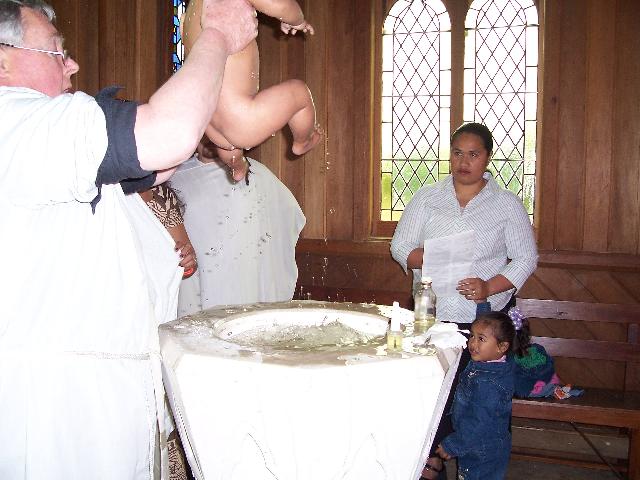
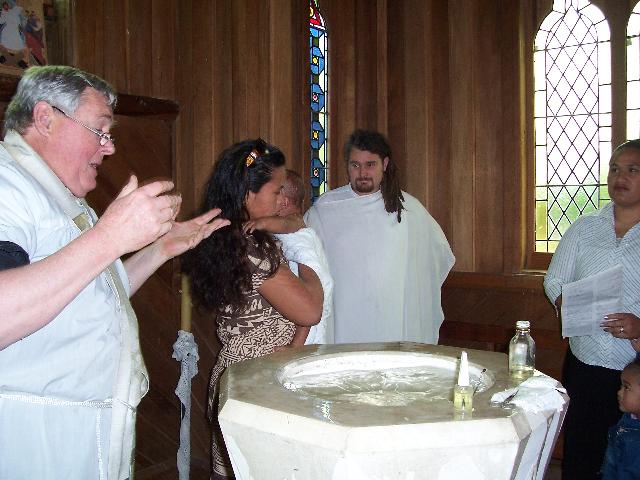
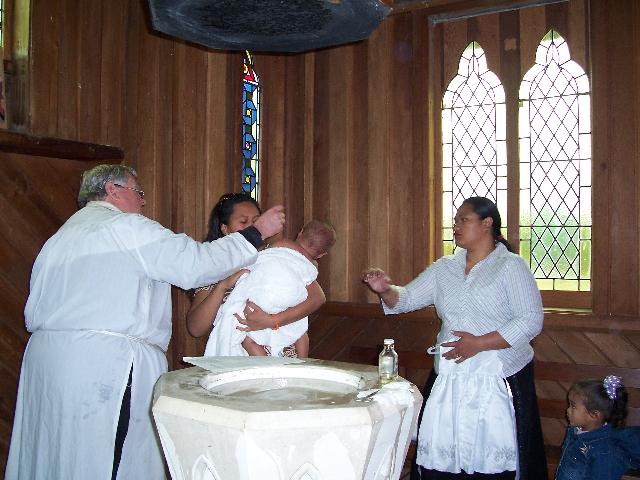
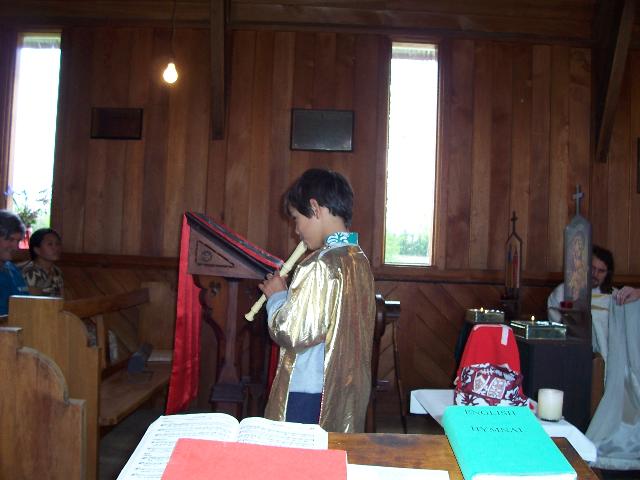
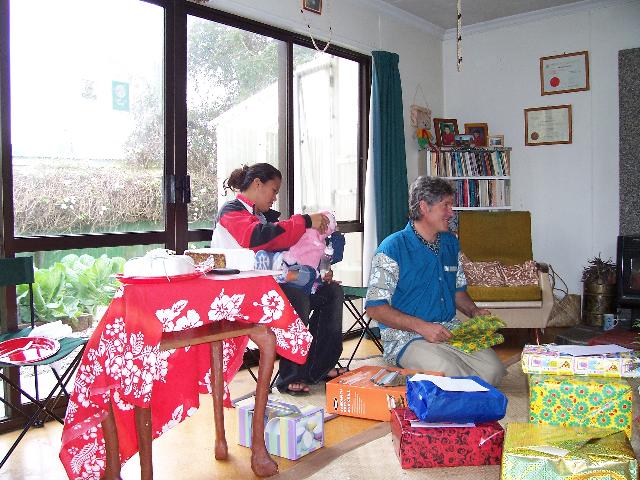
"Ode to Joy" opening presents
VISIT OF METROPOLITAN PAUL
ORDINATION OF DEACON MAX ATHANASIUS, 2005
Our Metropolitan Archbishop came to Christchurch on Friday, March 25 for a clergy symposium for NZ, which was also attended by numerous members of the Canterbury missions. During this weekend he ordained Max Athanasius Perkins as Deacon at a Liturgy at 9 am on Saturday 26. He also presided at Fr Victor's regular Sunday Liturgy at 10 am on the 27th, the second Sunday in Lent. Fr Jack was afflicted with a most awful cold and had to miss the Friday evening, and was able only to sit at the back for the other services. This had the remarkable result of allowing him to observe how perfectly everyone managed without his assistance; which bodes well for the future. Unfortunately Howick, Auckland was not able to be represented, but Wellington and Dunedin were.
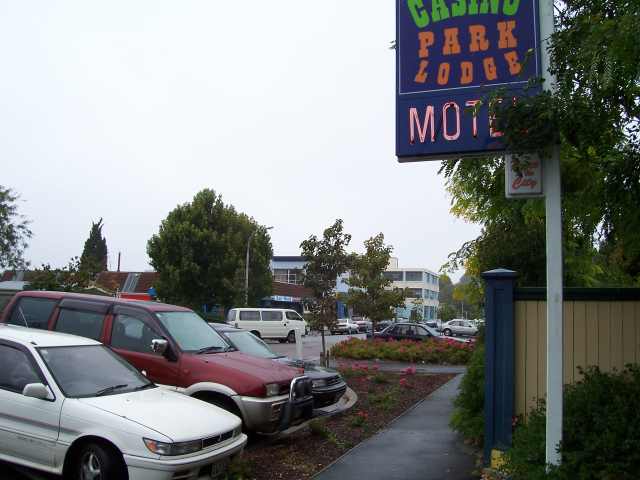
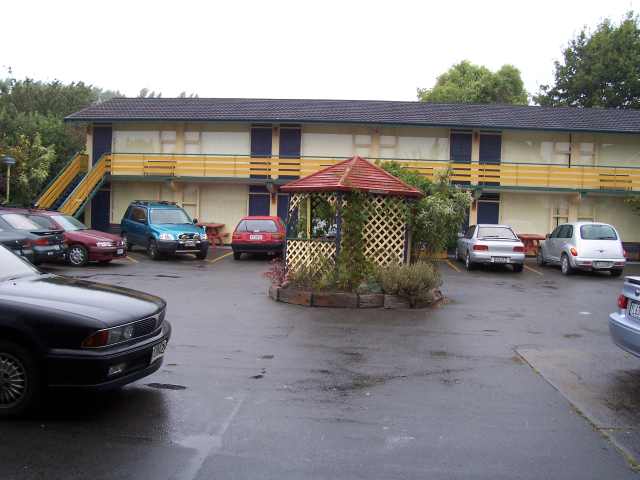
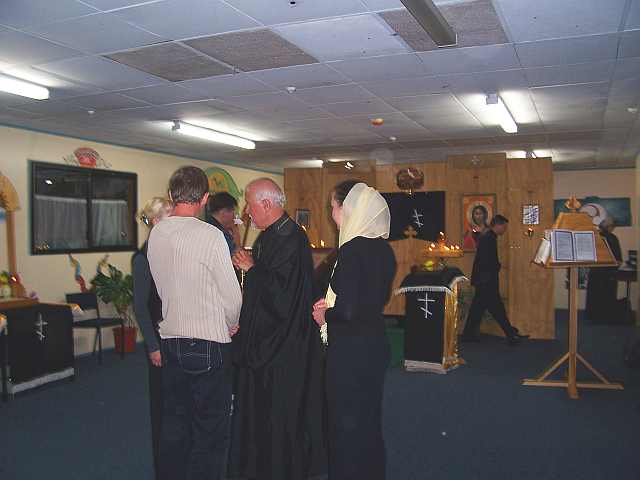
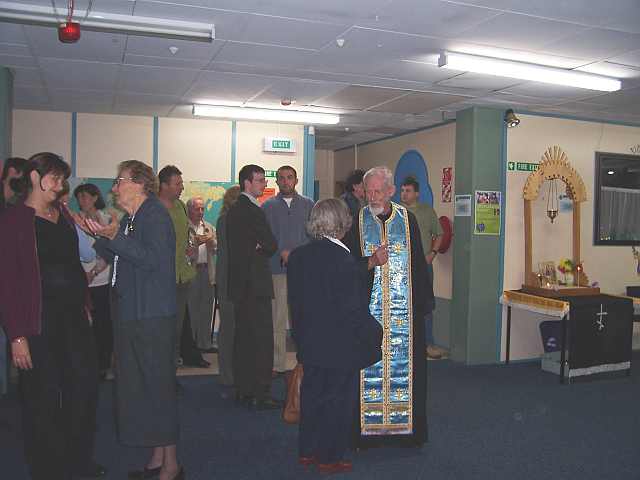
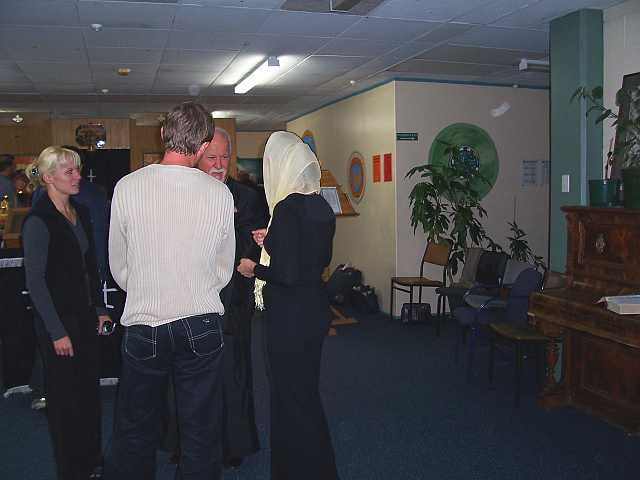
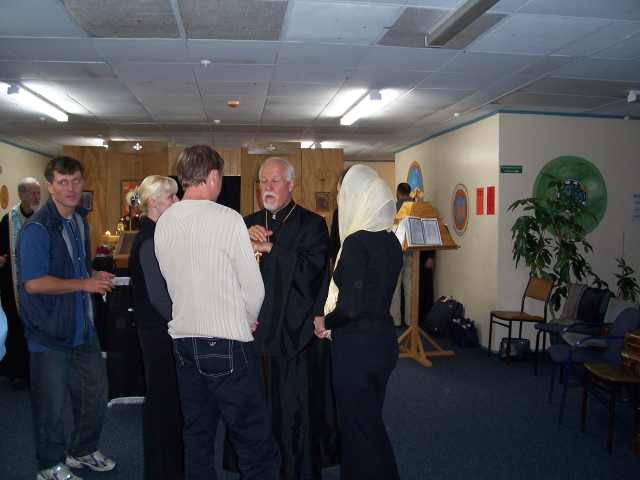
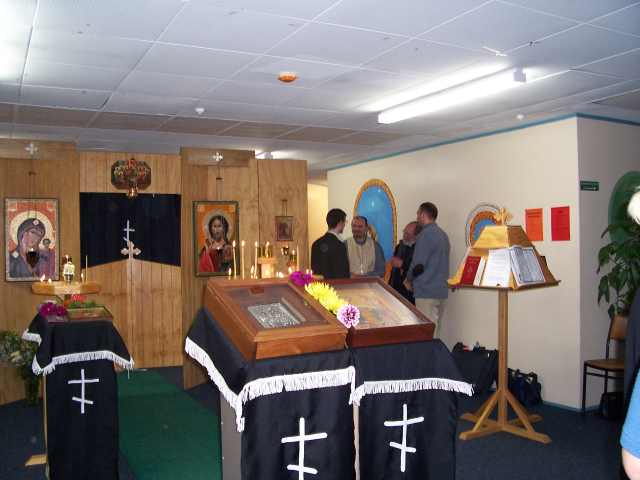
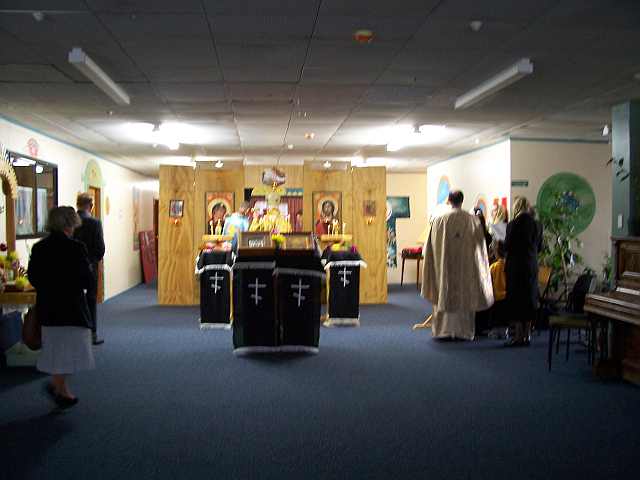
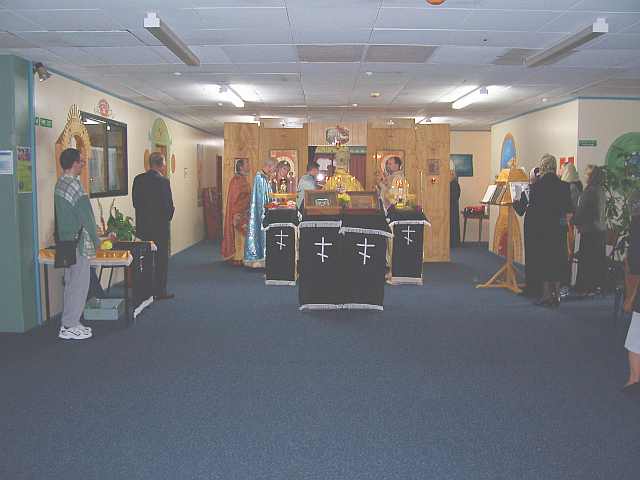
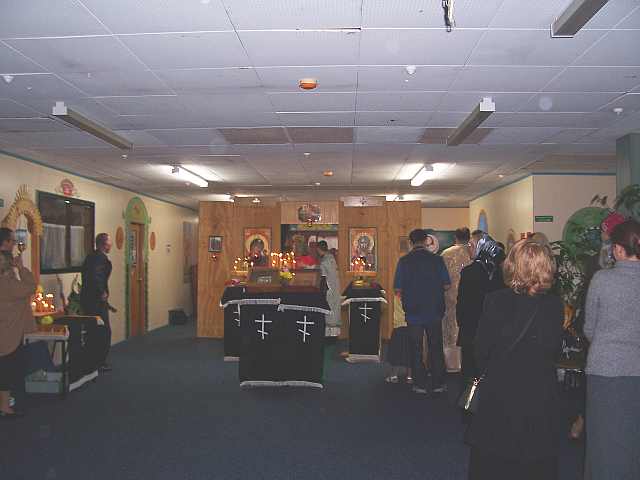
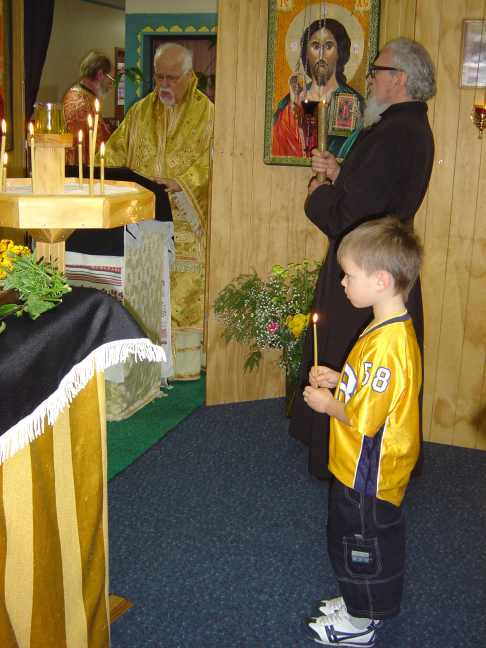
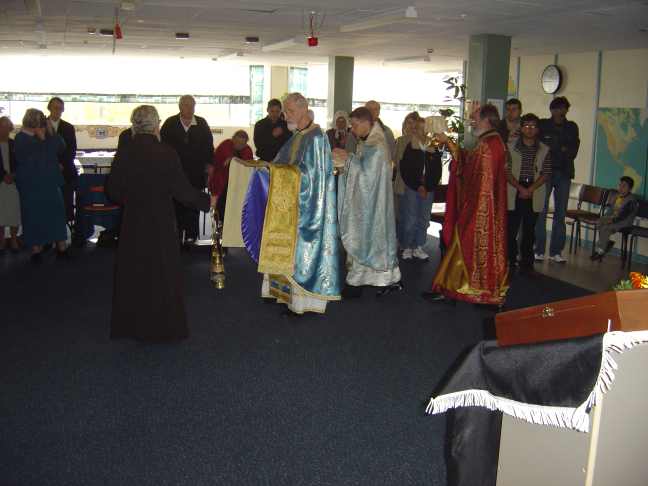
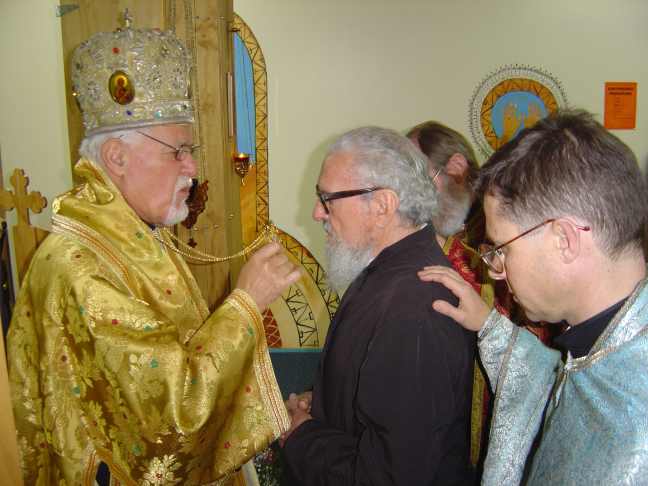
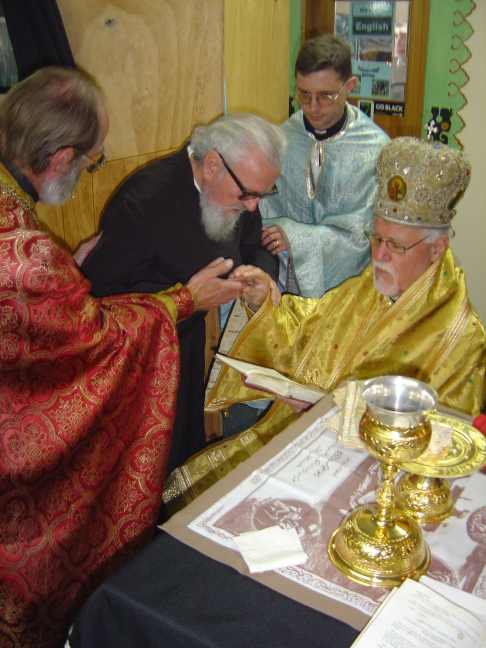
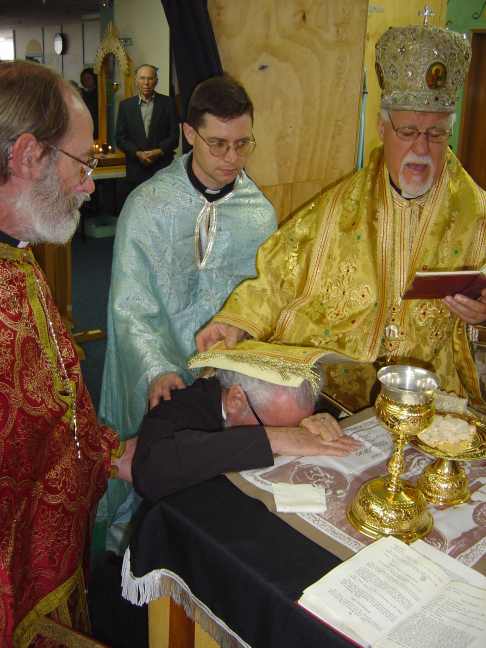
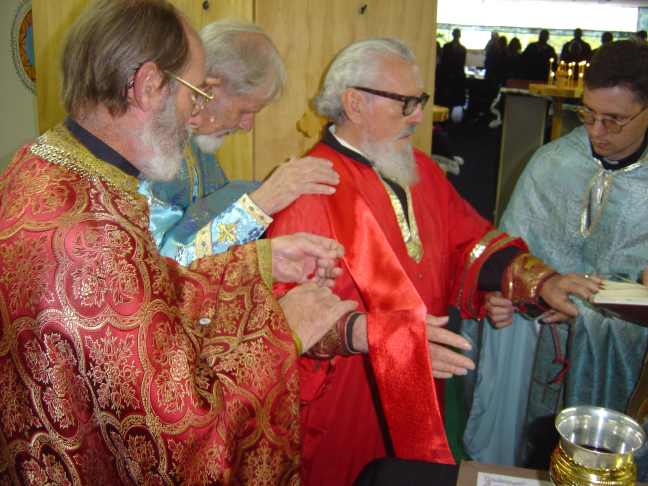
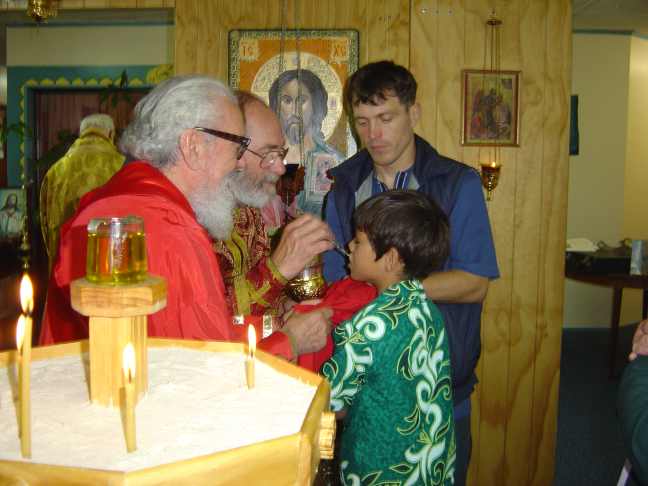
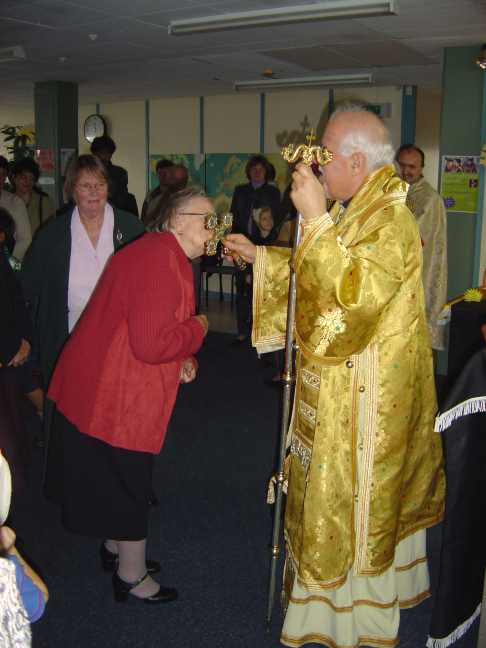
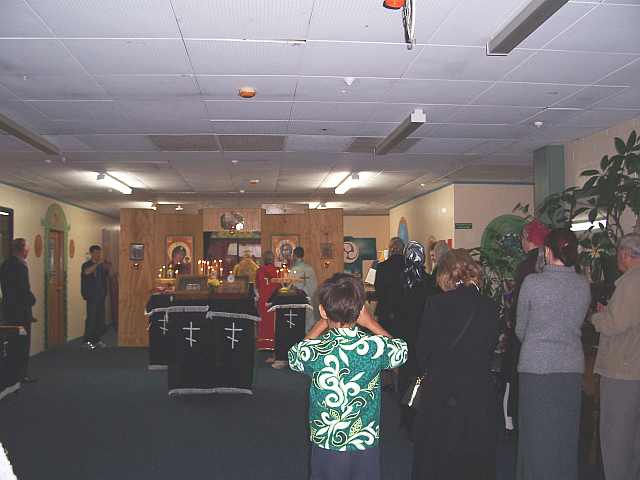
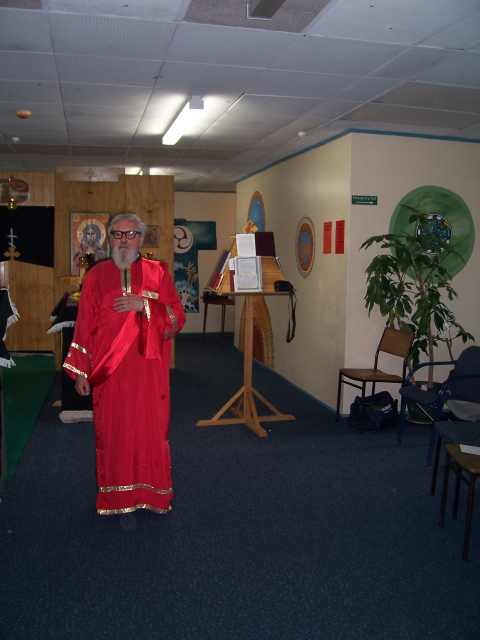
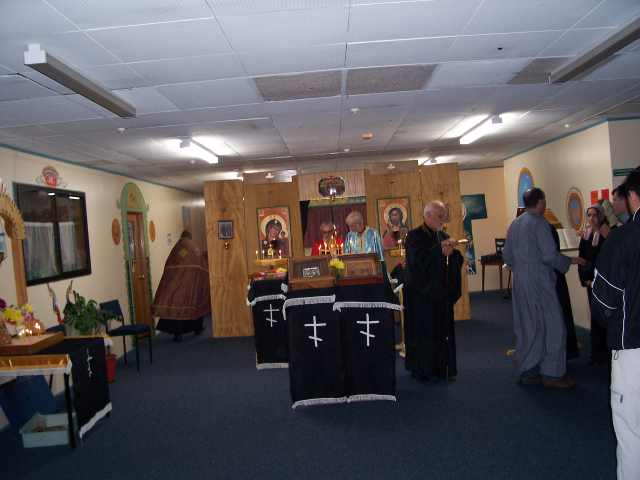
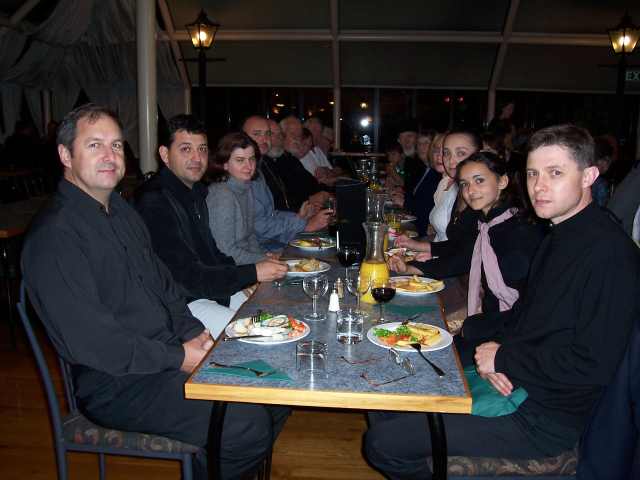
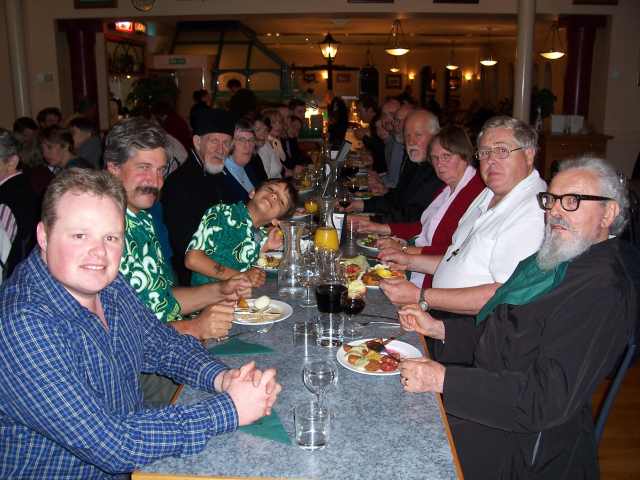
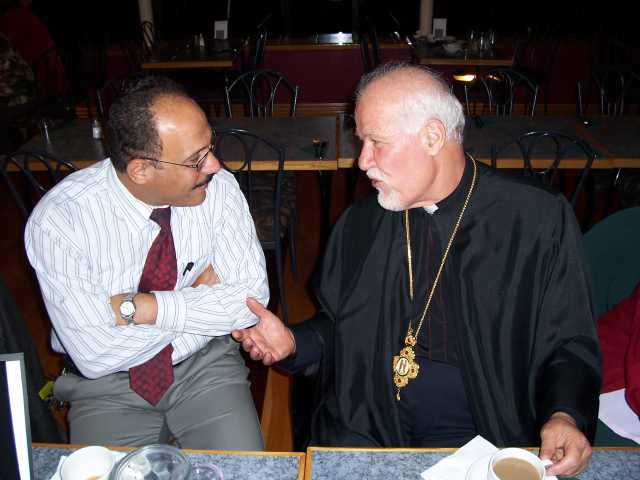
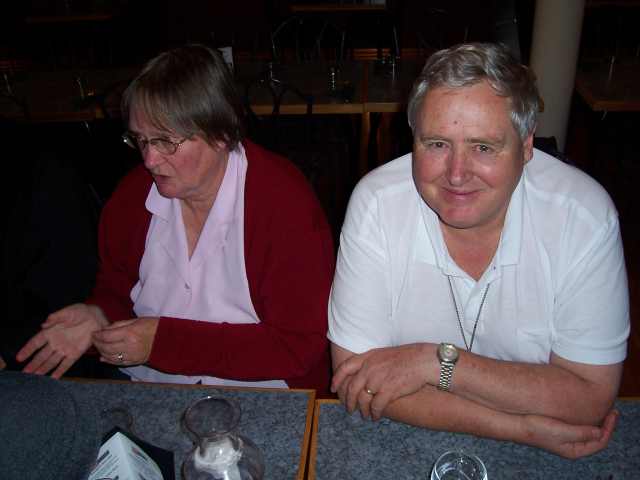
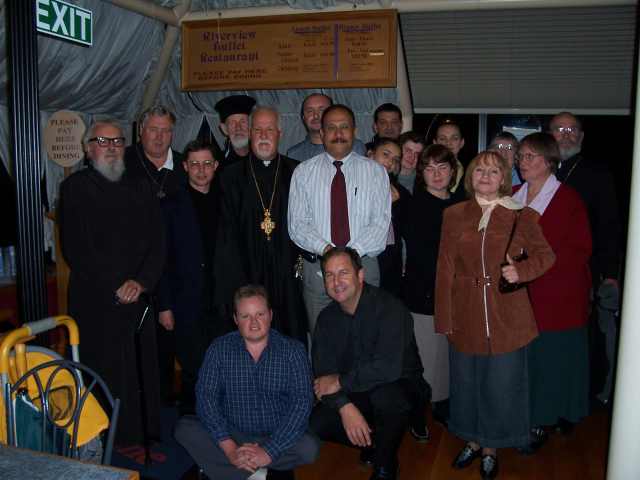
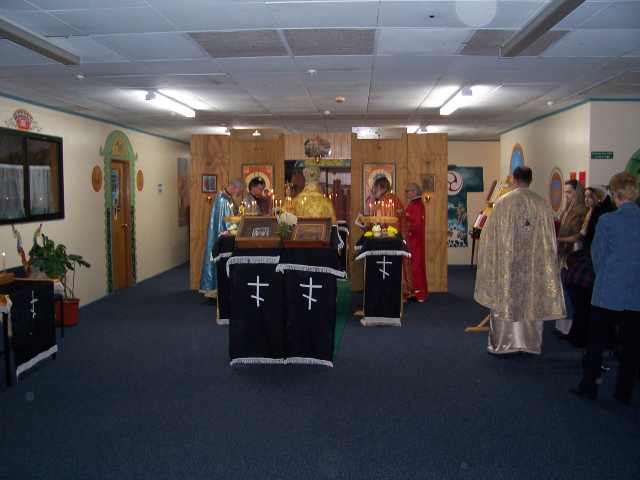
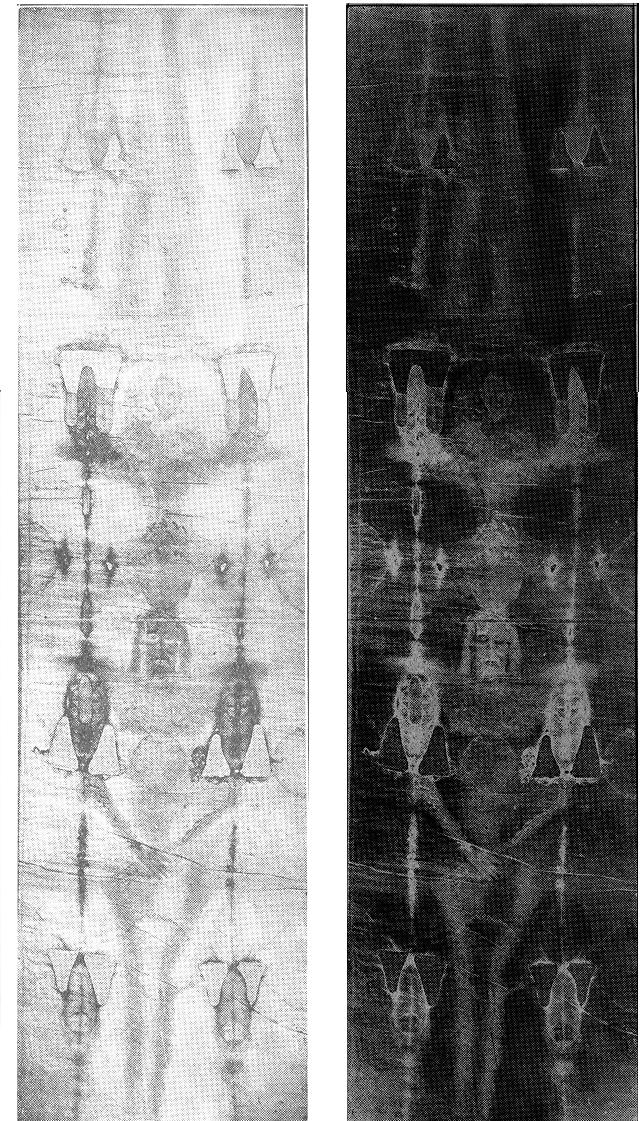 New
Chemical Testing Points to Ancient Origin for Burial Shroud of Jesus;
New
Chemical Testing Points to Ancient Origin for Burial Shroud of Jesus;